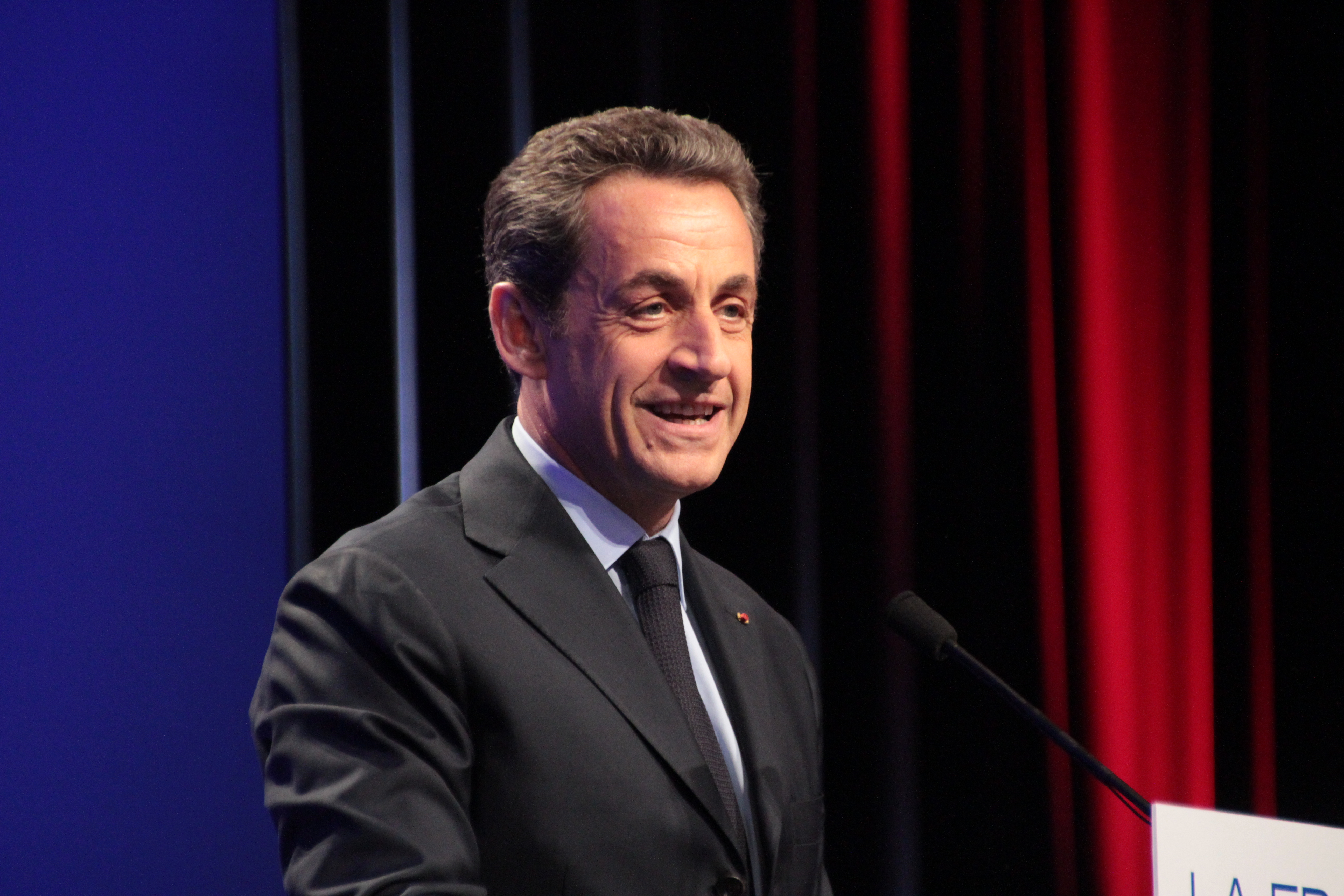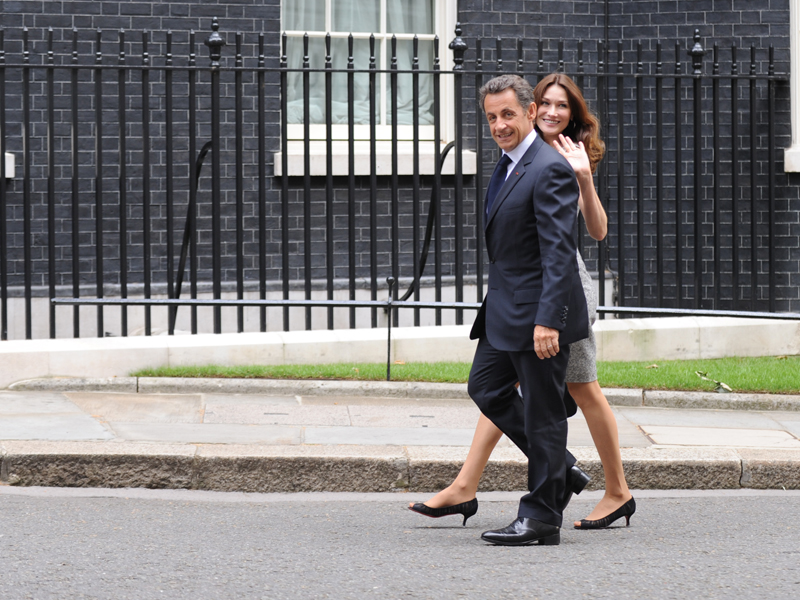French Scandals and Politics: The Return of A Bling Bling President
 Meeting de Nicolas Sarkozy à Nancy (2 avril 2012)
Meeting de Nicolas Sarkozy à Nancy (2 avril 2012) (credits to UMP Photos via Flickr)

(Flickr Creative Commons)
In 2007, Nicolas Sarkozy came as a breath of fresh air while the economy dawned an imminent recession. What exactly made him different from a heavily “Gaullist” Chirac-influenced political system, with the occasional far-right figures, dating back to the 70s? He was new. Using his charm and his approach to improve international relations and globalization, he succeeded in seducing the French people into hopes of reforms, dynamism and change. [1]
However, the economic crisis hit in late 2008 and eventually slowed down the rhythm of economic reforms by Sarkozy’s government. The disappointed masses came soon after. The struggle to re-establish economic growth resulted in many cutbacks, notably in state salaries, causing general discontentment among university and school teachers, transport labor unions and others.[2] This saw Sarkozy’s following years in office enduring successive strikes and growing opposition.
Five months into his term, Sarkozy announced he was divorcing his omnipresent wife during his campaign, Cecilia Ciganer-Albeniz. He then became the first “bachelor president” of France’s Fifth Republic. After a while, the truth came out behind this sudden divorce. Cecilia Ciganer-Albeniz, now Attias, left her husband to marry her lover, whom she had an affair with while married to Nicolas Sarkozy.[3] This created a wave of outrage and speculation on the public image of the president and every little rumor about Sarkozy’s personal life sparked the interest of tabloids and magazines around the world. This sudden shift from headlining the political and economic progress of the current government to the hearsay of the president’s whereabouts angered many of the unions and political parties originally discontent with the management of the country. The rumors had not yet died down when Sarkozy attended a dinner party and met ex-supermodel and singer-songwriter Carla Bruni.[4 ]After what is now referred to as a “whirlwind romance”, they married in February 2008 at the Elysée. The speculations on the president’s personal life ignited once again, discussing how long this unlikely union would last. Once again, the focus was taken away from the work the president and his government were doing and given to frivolous news of the newest presidential couple. [5]
While Sarkozy still remained the head of the UMP (Union for Popular Movement), his unpopularity due to his many scandals and failures to halt the financial crisis and increasingly heavy national public debt made him a shaky candidate for a second term. Among his opponents stood Socialist Dominique Strauss-Kahn, ex-finance minister and head of the IMF. He was a giant among politicians and economists, and was predicted to trample Sarkozy at the 2012 elections. He seemed like an ideal candidate to take the reins of the French nation and drive the economy out of the atrocious recession, the biggest since the Great Depression. The international community was left in shock when allegations of a sexual assault on a NY hotel maid were made in early 2011.[6] The trials came one after the other, with more proof of DSK’s debauched lifestyle, his arrest in May 2011 and culminating in the separation with wife of 21 years Anne Sinclair in 2012.[7] This left the Socialists’ counter-Sarkozy dreams shattered. Party head Martine Aubry finally made the announcement of the next Socialist presidential candidate, ex-Socialist Party head and ex-husband of Sarkozy’s strongest 2007 presidential contender Ségolène Royal: Francois Hollande.

(credits to Adrien Mogenet via Flickr)
So close to the elections, the French people saw a parading president, earning him the infamous nickname “président bling bling”, and a flustered Socialist party opposition. However, as much as Francois Hollande’s cheery and homey personality and his “man of the people” policies pleased the ears of the majority of the French working class, the ever-present exasperation at Sarkozy’s failed reforms and exuberant personal life are what gave the final push to the UMP head off the steps of the Elysée. As a last effort, Sarkozy promised stricter immigration and security policies to try to win some far-right votes, which was a sour political move for the working class and French generations of immigrants. After the first round, Sarkozy came second to Hollande, while the far-right Front National held 20% of the votes. The disfavour of the FN leader Marine Le Pen towards the president would be decisive in Sarkozy’s imminent and crushing defeat.[8] Sarkozy announced his retirement from politics shortly after his loss. [9]
Once more, the French put their country in the hands of a new ideal, swayed from Sarkozy’s right-wing regime to Holland’s left-wing socialist policies, desperately trying to find a stable government to claw France away from the recession. While Sarkozy’s efforts, with German chancellor Angela Merkel, to reform and discipline the European economy to an eventual slow-down of the recession were quickly forgotten and eclipsed by the president’s personal romance, a new way of thinking started emerging: the need for growth. The population grew impatient and felt that stopping the recession was simply not enough: France needed to get back on its wheels. Out comes Francois Hollande, bearing Keynesian ideals of increased government spending and higher income taxes to reduce national debt, promising future economic growth and a different presidential public image. [10] The French liked the stability and sympathetic front of the couple Hollande-Trierweiler and strived for someone as far from Sarkozy as they could go. This obsessive need for growth and change totally erased what France really needs: strict reforming and low spending to reduce the enormous public debt.
Two years into his term, Hollande’s policies have yet to show results. Constant shifting between cutbacks and spending, austerity or stimulus, left the French confused and rigid. In August, the cabinet itself was left in internal struggle over the effectiveness of the current policies, causing Hollande to dissolve his own government in hopes of a restructure of the cabinet towards higher efficiency. This only left the country in complete chaos: how can this man lead the country if he cannot unite his own office?[11] Meanwhile, Hollande has had his fair share of presidential scandals: his relationship with partner and first lady Valerie Trierweiler was terminated after allegations of a two-year long affair with actress Julie Gayet surfaced. Photos were taken of the president traveling by moped to and from the Elysée and their apartment in central Paris. Rumours also appeared of a possible reunion with ex-wife Ségolène Royal[12], on top of an autobiographic book release by ex-partner Trierweiler last month, in which she reveals shocking stories about the president. As much as the French despise bad economic policies, they seem to absolutely love bad literature: the book was an instant bestseller, grossing roughly 9 million euros in the first 16 days on shelves. [13] Francois Hollande’s approval ratings plummeted to a record low, making him the least liked French president in recorded history. [14]
In the midst of Hollande’s debacle, the return of Nicolas Sarkozy in politics seemed perfectly timed. Although, from his old contradiction tendencies, this announcement surprised few, it might just be the push France needs. Sarkozy’s promises and implemented policies in 2007 were on the right track to deal with the financial crisis, despite his unpopularity due to an overly “rock-star” lifestyle that shadowed economic progress. Following the German plan of government austerity and cutbacks to minimize damages from the recession, reduce debt and slowly jumpstart the economy, France could emerge and finally deal with the public debt and faster growth head-on. The idealist need for rushed growth during a recession might not be the best policy, and it might not be what the people should look for in a presidential candidate. However, Sarkozy’s path to presidency once again is not the yellow brick road: allegations of fraud during his 2012 campaign, where his party spent almost double the allowed amount through back-channelling, have resurfaced. [15]He might not be the least liked president any longer but his image as “bling bling president” is well engraved in the French mind and will not be discarded unless real impact is made. Can the French forego yearning for growth and make amends for the greater well-being of the economy? Will a different political leader, perhaps carrying the goals of the UMP in 2007, rise to expectations by 2017 or will the French have to make do with a “lesser of two evils”?
[1] Pedder, Sophie. “Atypically French: Sarkozy’s Bid to Be a Different Kind of President.” Foreign Affairs. Council on Foreign Relations, 1 June 2007. Web. 3 Oct. 2014. < http://www.foreignaffairs.com/articles/62628/sophie-pedder/atypically-french-sarkozys-bid-to-be-a-different-kind-of-preside >.
[2] Ryan, Yasmine. “Scorecard: Sarkozy’s Presidency.” Al Jazeera. 17 Apr. 2012. Web. 3 Oct. 2014. < http://www.aljazeera.com/indepth/features/2012/04/201241663019237708.html >.
[3] Reilly, Jill. “Sarkozy’s Ex-wife Reveals [..]. Daily Mail Online. Associated Newspapers, 4 Oct. 2013. Web. 8 Oct. 2014. < http://www.dailymail.co.uk/news/article-2443631/Cecilia-Attias-tells-friends-tried-snap-Sarkozy-divorce-Carla-Bruni-got-first.html >.
[4] Trebay, Guy. “The French President’s Lover.” The New York Times. The New York Times, 12 Jan. 2008. Web. 8 Oct. 2014. < http://www.nytimes.com/2008/01/13/fashion/13bruni.html >.
[5] Sciolino, Elaine. “French Leader and Ex-Model Wed in Quiet Ceremony.” The New York Times. The New York Times, 2 Feb. 2008. Web. 8 Oct. 2014. < http://www.nytimes.com/2008/02/03/world/europe/03sarkozy.html >.
[6] Chrisafis, Angelique. “Arrest of Dominique Strauss-Kahn Rocks French Presidential Race.” The Guardian. The Guardian, 15 May 2011. Web. 8 Oct. 2014. < http://www.theguardian.com/world/2011/may/15/strauss-kahn-arrest-hits-french-elections >.
[7] Walker, Jade. “Dominique Strauss-Kahn, Anne Sinclair Have Separated, Source Says.” The Huffington Post. The Huffington Post, 28 June 2012. Web. 8 Oct. 2014. < http://www.huffingtonpost.com/2012/06/28/dominique-strauss-kahn-anne-sinclair-separated_n_1636183.html >.
[8] Allen, Peter. “Sarkozy Comes out Fighting […].” Daily Mail Online. Daily Mail, 22 Apr. 2012. Web. 8 Oct. 2014. < http://www.dailymail.co.uk/news/article-2133426/French-presidential-elections-2012-results-Nicolas-Sarkozy-takes-hammering-1st-round.html >.
[9] Allen, Peter. “‘I Love Life Too Much to Be Bitter’: Sarkozy Confirms He Will Quit Politics for Good […].” Daily Mail Online. Associated Newspapers, 7 May 2012. Web. 8 Oct. 2014. < http://www.dailymail.co.uk/news/article-2140864/Nicolas-Sarkozy-confirms-quit-politics-good-says-wants-people-leave-alone.html >.
[10] Schofield, Hugh. “How Francois Hollande Won.” BBC News. BBC, 6 May 2012. Web. 8 Oct. 2014. < http://www.bbc.com/news/world-europe-17978114 >.
[11] Hinnant, Lori, and Sylvie Corbet. “Hollande Dissolves French Government over Economic Policy.” The Globe and Mail. The Associated Press, 25 Aug. 2014. Web. 8 Oct. 2014. < http://www.theglobeandmail.com/news/world/hollande-dissolves-government-sending-french-politics-into-disarray/article20189160/ >.
[12] Allen, Peter. “French President on the Verge of Dumping Actress Lover […].” Daily Mail Online. Associated Newspapers, 14 Mar. 2014. Web. 8 Oct. 2014. < http://www.dailymail.co.uk/news/article-2580890/French-President-Francois-Hollande-said-dump-Julie-Gayet-replaced-First-Lady-rekindle-relationship-lover-Segolene-Royal.html >.
[13] “Valerie Trierweiler devient millionnaire grace à son livre choc.” Le Figaro. Figaro, 24/09/2014. Web. 8 Oct. 2014. < http://www.lefigaro.fr/argent/2014/09/24/05010-20140924ARTFIG00232-valerie-trierweiler-devient-millionnaire-grace-a-son-livre-choc.php >
[14] Lichfield, John. “François Hollande’s Popularity at Rock Bottom, but He Has No Intention of Quitting.” The Independent. Independent Digital News and Media, 18 Sept. 2014. Web. 8 Oct. 2014. < http://www.independent.co.uk/news/world/europe/franois-hollandes-popularity-at-rock-bottom-but-he-has-no-intention-of-quitting-9742177.html >.
[15] Lichfield, John. “Nicolas Sarkozy’s 2017 Comeback in Jeopardy as Fraud Scandal Forces Opposition Party Leader Jean-François Copé to Quit.” The Independent. Independent Digital News and Media, 28 May 2014. Web. 8 Oct. 2014. < http://www.independent.co.uk/news/world/europe/sarkozys-2017-comeback-in-jeopardy-as-fraud-scandal-forces-party-leader-to-quit-9442325.html >.
